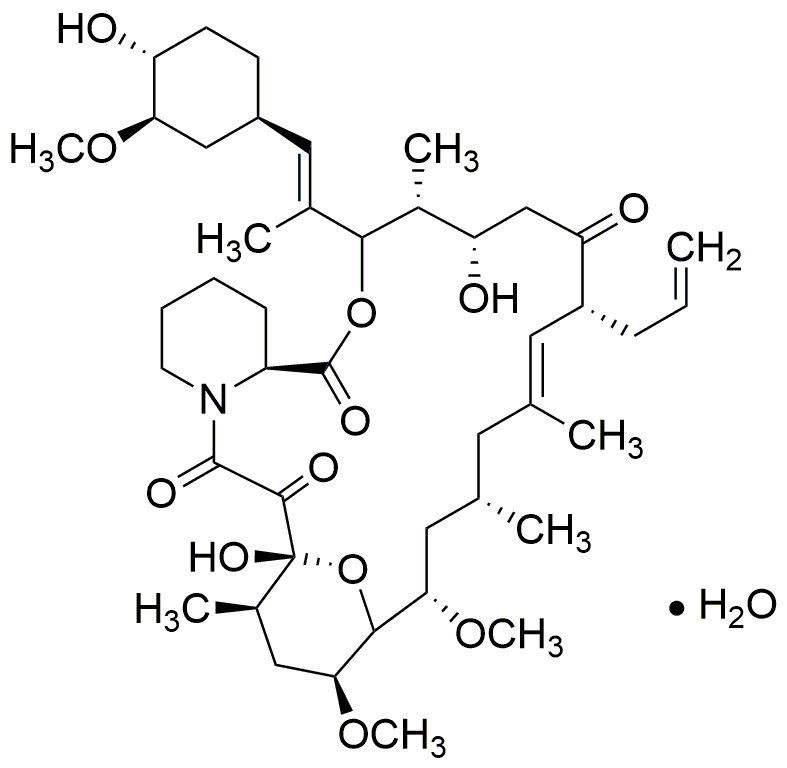Tacrolimus monohydrate is widely utilized in research focused on:
- Immunosuppressive Therapy: Commonly used in organ transplantation to prevent rejection, it helps maintain the body’s immune response at a manageable level, making it crucial for patients receiving kidney, liver, or heart transplants.
- Dermatological Treatments: Employed in topical formulations for conditions like eczema and psoriasis, it reduces inflammation and helps in skin healing, offering an alternative to traditional corticosteroids.
- Research in Autoimmune Disorders: Investigated for its efficacy in treating autoimmune diseases such as lupus and rheumatoid arthritis, providing insights into new therapeutic approaches that can improve patient outcomes.
- Veterinary Medicine: Used in veterinary practices for immunosuppression in transplant procedures or severe skin conditions in animals, demonstrating its versatility beyond human medicine.
- Pharmaceutical Development: Serves as a model compound in drug formulation studies, helping researchers understand drug interactions and stability, which is vital for developing new medications.
General Information
Properties
Safety and Regulations
Applications
Tacrolimus monohydrate is widely utilized in research focused on:
- Immunosuppressive Therapy: Commonly used in organ transplantation to prevent rejection, it helps maintain the body’s immune response at a manageable level, making it crucial for patients receiving kidney, liver, or heart transplants.
- Dermatological Treatments: Employed in topical formulations for conditions like eczema and psoriasis, it reduces inflammation and helps in skin healing, offering an alternative to traditional corticosteroids.
- Research in Autoimmune Disorders: Investigated for its efficacy in treating autoimmune diseases such as lupus and rheumatoid arthritis, providing insights into new therapeutic approaches that can improve patient outcomes.
- Veterinary Medicine: Used in veterinary practices for immunosuppression in transplant procedures or severe skin conditions in animals, demonstrating its versatility beyond human medicine.
- Pharmaceutical Development: Serves as a model compound in drug formulation studies, helping researchers understand drug interactions and stability, which is vital for developing new medications.
Documents
Safety Data Sheets (SDS)
The SDS provides comprehensive safety information on handling, storage, and disposal of the product.
Product Specification (PS)
The PS provides a comprehensive breakdown of the product’s properties, including chemical composition, physical state, purity, and storage requirements. It also details acceptable quality ranges and the product's intended applications.
Certificates of Analysis (COA)
Search for Certificates of Analysis (COA) by entering the products Lot Number. Lot and Batch Numbers can be found on a product’s label following the words ‘Lot’ or ‘Batch’.
Numéro de catalogue
Numéro de lot/série
Certificates Of Origin (COO)
This COO confirms the country where the product was manufactured, and also details the materials and components used in it and whether it is derived from natural, synthetic, or other specific sources. This certificate may be required for customs, trade, and regulatory compliance.
Numéro de catalogue
Numéro de lot/série
Safety Data Sheets (SDS)
The SDS provides comprehensive safety information on handling, storage, and disposal of the product.
DownloadProduct Specification (PS)
The PS provides a comprehensive breakdown of the product’s properties, including chemical composition, physical state, purity, and storage requirements. It also details acceptable quality ranges and the product's intended applications.
DownloadCertificates of Analysis (COA)
Search for Certificates of Analysis (COA) by entering the products Lot Number. Lot and Batch Numbers can be found on a product’s label following the words ‘Lot’ or ‘Batch’.
Numéro de catalogue
Numéro de lot/série
Certificates Of Origin (COO)
This COO confirms the country where the product was manufactured, and also details the materials and components used in it and whether it is derived from natural, synthetic, or other specific sources. This certificate may be required for customs, trade, and regulatory compliance.


